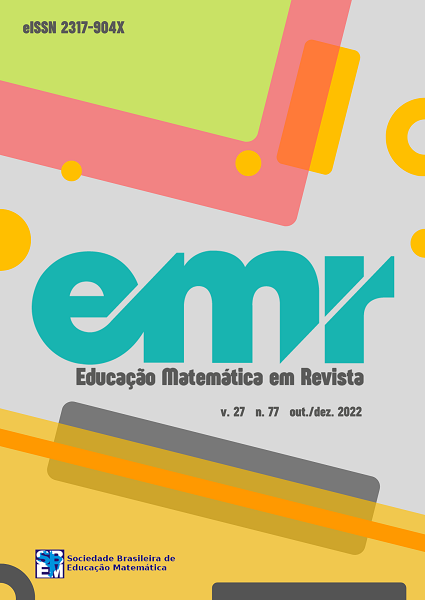An analysis of online digital games and their contributions to 1st degree equation learning
DOI:
https://doi.org/10.37001/emr.v27i77.2928Keywords:
Algebra, Equation of the 1st degree, Digital gamesAbstract
This work presents the results of a research that aims to map the digital teaching resources to assist in the teaching of 1st grade equation in the 7th year of Elementary School. Therefore, we carried out a qualitative research in which we surveyed digital teaching resources that had free access and were characterized by approaching the concept of equation. Online digital games were identified that are potentially significant and that can help in learning the 1st degree equation. After analyzing the games, we made the categorizations in order to point out the main characteristics of the games, with the procedural aspect being the most predominant and related to equation solving, followed by the conceptual aspect as the second most predominant, in addition to the emphasis on mental calculation. . We conclude that the digital games analyzed contribute to the assimilation of the concept of equation and its resolution procedure, being necessary for the teacher to discuss the role of the variable and equality to avoid misunderstandings and conceptual errors, as well as to build the digital games, favoring the insertion of the digital culture in Mathematics classes placing them as resources that integrate the teaching-learning process, in addition to developing digital skills present in the subdomains of Technology, Pedagogy and Content Knowledge (TPCK).
Downloads
References
ALAMIAN, V.; MOGHADAM, M. K. Investigating the effect of teaching mathematics based on Bruner Theory on eighth-grade male students' misconceptions in equation solving. Archives of Pharmacy Practice, v. 11, n.1, p. 55- 60, 2020.
BENNISON, A., GOOS, M. Learning to teach mathematics with technology: a survey of professional development needs, experiences and impacts. Mathematics Education Research Journal, v. 22, n. 1. p. 31–56, 2010.
BOOTH, J. L. Persistent and pernicious errors in algebraic problem solving. Journal of Problem Solving. v. 7, p. 10-23, 2014.
BRASIL. Base nacional comum curricular. BrasÃlia: MEC/Secretaria de Educação Básica, 2018.
BRASIL. Parâmetros curriculares nacionais para o ensino médio: matemática. BrasÃlia: MEC, 1998.
CAI, J.; NIE, B.; MOYER, J. C. The teaching of equation solving: approaches in Standards-based and traditional curricula in the United States, Pedagogies: An International Journal, v.5, n.3, p. 170-186, 2010.
CARPENTER, T. P.; LEVI, L. Developing conceptions of algebraic reasoning in the primary grades. DisponÃvel em: https://files.eric.ed.gov/fulltext/ED470471.pdf. Acesso em: 22 ago. 2021.
DANYLUK, O. S. Alfabetização matemática: o cotidiano da vida escolar. Caxias do Sul: EDUCS, 1993.
DRIJVERS, P. Digital technology in mathematics education: why it works (or doesn’t). DisponÃvel em: https://www.researchgate.net/publication/268368816_Digital_Technology_in_Mathematics_Education_Why_It_Works_Or_Doesn't. Acesso em: 18 fev. 2021.
EARNEST, D.; BALTI, A. A. Instructional strategies for teaching algebra in elementary school: findings from a research-practice collaboration. DisponÃvel em: https://ase.tufts.edu/devtech/courses/readings/EarnestBalti2008.pdf. Acesso em: 30 abr. 2021.
ERTEKIN, E. Predicting eight grade students' equation solving performances via concepts of variable and equality. Journal of Education and Practice, v.8, n.21, p.74-80, 2017.
FIORENTINI, D., MIORIM, M. A., MIGUEL, A. Contribuições para um Repensar... a Educação Algébrica Elementar. Pro-Posições, v. 4, p. 78 – 91, 1993.
KOEHLER, M. J., MISHRA, P. What happens when teachers design educational technology? the development of technological pedagogical content knowledge. Journal of Educational Computing Research, v. 32, n. 2, p.131-152, 2005.
KAPUT, J. J. Teaching and learning a new algebra with understanding. DisponÃvel em: https://files.eric.ed.gov/fulltext/ED441662.pdf. Acesso em: 22 ago. 2021.
LINS, R. C.; GIMENEZ, J. Perspectivas em aritmética e álgebra para o século XXI. Campinas, SP. Papirus, 1997.
MISHRA, P., KOEHLER, M. J. Technological pedagogical content knowledge: a framework for teacher knowledge. Teachers College Record, v. 108, n. 6, p. 1017-1054, 2006.
PATTON, M. Q. Qualitative evaluation methods. Beverly Hills: Sage Publications, Inc., 1986.
PIRES, F. S.; SOUSA, M. C. Reflexões sobre o ensino de álgebra a partir da análise de concepções e do conceito de variável. DisponÃvel em: https://xiii.ciaem-redumate.org/index.php/xiii_ciaem/xiii_ciaem/paper/viewFile/1328/563. Acesso em: 10 mar. 2021.
PONTE, J. P. da. Números e Ãlgebra no currÃculo escolar. DisponÃvel em: https://repositorio.ul.pt/bitstream/10451/4525/1/06-Ponte%28Caminha%29.pdf. Acesso em: 17 ago. 2021.
SAMUEL, K.; MULENGA, H. M.; ANGEL, M. An investigation into challenges faced by secondary school teachers and pupils in algebraic linear equations: a case of Mufulira District, Zambia. Journal of Education and Practice. v.7, n.26, p. 99 – 106, 2016.
SILVA, C. P. Aspectos históricos do desenvolvimento da pesquisa matemática no Brasil. São Paulo: Editora Livraria da FÃsica/SBHMat, 2009.
SITE COQUINHOS. Jogos envolvendo equações. DisponÃvel em: https://www.coquinhos.com/. Acesso em: 18 fev. 2021.
USISKIN, Z. Concepções sobre a álgebra da escola média e utilizações das variáveis. In: COXFORD, A. F., SHULTE, A. P. As ideias da álgebra. São Paulo: Atual, 1995.
VYGOTSKY, L. S. Pensamento e linguagem. São Paulo: Martins Fontes, 1998.
Published
How to Cite
Issue
Section

This work is licensed under a Creative Commons Attribution-NonCommercial-ShareAlike 4.0 International License.






